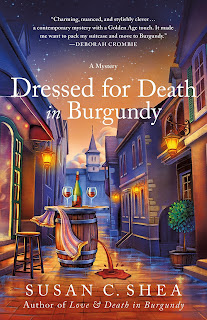Q: How do you handle the passage of time and the aging of characters in your series? Are your characters living in a short span of time while many years pass in our world? Does time pass at roughly the same pace as the publication of each book? Or do you have a different method?
-from Susan
Good question. My answer is couched in the fact that I have written two series, one with three books (the Dani O’Rourke series) and one with two so far (the French Village novels). I haven’t had to deal with what is a good question for a long-term series I wish I had.
I have let time pass, although not in the same measure as each book is published. For the first series, I let a few months go by between events because I couldn’t see how a normal person could reel from one shocking incident to another unless she was a police officer or someone else who comes across murder victims as part of daily life. I needed to keep the tension between Dani and her former husband fresh, though, so the time elapsed couldn’t drag out too long. He could be a pest, but not a mentally unstable stalker! Because there are only three books, no one’s had time to get old or for me to force them to drink an elixir of youth to keep going.
I conceived the French series as stories set in seasons that were, in a sense, characters. The first in high summer in pastoral Burgundy was a time for spending days and – importantly – nights outdoors, flowers in full bloom, meals on a dappled, sunlit patio, excursions to the summer flea markets. It helped significantly with the plot and to show my characters in three dimensions. The second was set during the two weeks before Christmas, a very different season and setting. People inside more, their shopping different, their chores and priorities relevant to the winter holiday. I needed cold and wet to push them toward and away from each other as the plot demanded. And I wanted Christmas Eve as a resolution and a grace note for the little town. If there had been a third, it would have taken place in April, when spring is bursting forth, farmers are sowing alfalfa and the winter-born calves are getting frisky.
The publisher agreed, witness the distinctly seasonal covers.



Susan I think your last comment is the operative one. That books be written so that the passage of time is unremarkable. I'm thinking particularly of Deborah Crombie's (18 or 19?) books in her series. You know time is passing because the characters have lives that change, but time is under the radar.
ReplyDeleteMy character, Samuel Craddock was older to begin with, so it has been tricky for me. I have tried to balance between not having a homicide in small town every few months, with not having him get decrepit. Largely I've done this by having the murders be historical or out of town or some such. But it is a tricky problem.
Yes, Terry, that's the core message. If we're pulled out of a book because we don't buy the passage or non-passage of time, it's not working.
ReplyDelete